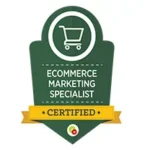What Is branding? And why is a brand strategy essential for business success?
Online branding is a brand management technique that uses the internet and social media channels as a medium for positioning a brand in the marketplace. It involves building the identity of a person or brand online using various online marketing channels such as a website, Google, Facebook, Instagram, blog post, and other online marketing channels.
The goal of online branding is to increase brand recognition and establish strong relationships with consumers.
Online branding can be done through a website, blog, social media profile, or online advertising. It is beneficial to every brand if planned and executed well, as it helps expand the exposure of the brand’s identity on the web to widen the reach of the brand, products, or services in front of potential customers.
Overall, online branding is essential for building a company’s online presence and reaching a larger audience. It helps in creating an online presence for a company, which is crucial in today’s digital age. By taking advantage of the internet and all of its various spaces, online branding can leverage a business’s position in its industry.
What are the key elements of a successful online branding strategy?
A successful online branding strategy involves several key elements that work together to create a strong and consistent brand image. Here are some of the important elements:
Brand identity: This includes your brand name, logo, tagline, and brand colors. A strong brand identity helps customers recognize and remember your brand.
Consistency: Consistency is key when it comes to branding. Your brand should be consistent across all online platforms, including your website, social media profiles, and email marketing campaigns.
Target audience: Knowing your target audience is crucial for creating a successful online branding strategy. You need to understand their needs, preferences, and behaviors to create a brand that resonates with them.
Content strategy: Your content should align with your brand’s values and mission. It should also be engaging and relevant to your target audience.
Online presence: Your online presence includes your website, social media profiles, and other online platforms where your brand is visible. A strong online presence helps you reach a wider audience and build brand awareness.
Positive Customer experience: Providing a positive customer experience is essential for building brand loyalty.
Make sure that your website is user-friendly, your customer service is responsive, and your products or services meet or exceed customer expectations.
By focusing on these key elements, you can create a successful online branding strategy that helps you stand out in a crowded digital marketplace.
What are some benefits of online branding?
Online branding has numerous benefits for businesses of all sizes. Here are some of the key benefits of online branding:
1. Brand recognition: Online branding ensures that your clients and potential clients commit your brand to memory, and can recognize it easily. By creating a consistent brand image across all online channels, businesses can establish a strong brand identity that is easily recognizable.
2. Increased customer loyalty: Online branding helps to build brand loyalty, which is considered to be one of the most vital customer aspects of any business. When people can see your brand consistently across all online channels, they are more likely to trust and remain loyal to your brand.
3. Direct sales: Online branding provides businesses with the ability to inform customers of any changes, new products, latest offers, and much more. This, in turn, can lead to direct sales.
4. Competitive advantage: Online branding takes advantage of the internet and all of its various spaces to leverage your position in your industry[2]. Without it, your business will see lower conversion and retention rates and reduced competitiveness with other businesses in your industry.
5. Wider reach: Online branding helps expand the exposure of the brand’s identity on the web to widen the reach of the brand, products, or services in front of potential customers. By taking advantage of the internet and all of its various spaces, online branding can leverage a business’s position in its industry.
Overall, online branding is essential for building a company’s online presence and reaching a larger audience. It helps in creating an online presence for a company, which is crucial in today’s digital age.
By taking advantage of the internet and all of its various spaces, online branding can leverage a business’s position in its industry.
Citations:
[1] https://www.qwertybrandsolutions.com/online-branding-solutions
[2] https://www.ronsela.com/internet-branding/
[3] https://www.husamjandal.com/why-online-branding-is-crucial-and-how-to-get-it-right/
[4] https://www.digitaldrop.in/blog/good-online-branding.html
[5] https://www.graphicsmerlin.com/top-5-benefits-online-branding-types-businesses/
[6] https://www.sprintzeal.com/blog/online-branding
How can online branding help with customer engagement?
Online branding can help with customer engagement in several ways. Here are some of the ways:
1. Building brand communities: Online branding can help businesses build brand communities where customers can engage with each other and the brand[1]. This can lead to increased customer engagement and loyalty.
2. Creating a consistent brand image: By creating a consistent brand image across all online channels, businesses can establish a strong brand identity that is easily recognizable[5]. This can help customers engage with the brand more easily.
3. Providing valuable content: Online branding can help businesses provide valuable content to customers, such as blog posts, videos, and social media updates[2]. This can help keep customers engaged with the brand and build trust.
4. Direct communication: Online branding provides businesses with the ability to communicate directly with customers and respond to their feedback and concerns[4]. This can help build a relationship of trust and engagement with customers.
5. Personalization: Online branding can help businesses personalize their communication with customers, such as through targeted email campaigns and personalized social media messages[6]. This can help build a stronger connection with customers and increase engagement.
Overall, online branding can help businesses build a strong online presence and engage with customers in a variety of ways. By creating a consistent brand image, providing valuable content, and communicating directly with customers, businesses can build strong relationships with their audience and increase customer engagement and loyalty.
Here are several proven effective brand building strategies and techniques.
Building a strong brand is essential for any business to succeed. Here are some effective brand-building strategies and techniques that businesses can use:
1. Define your target audience: To build a strong brand, businesses must first define their target audience[2][6]. This includes understanding their needs, with consumer insights that add flavor to the target definition. Then, businesses can figure out how their products or services should be positioned.
2. Develop a vision statement: A vision statement should clearly state what your company stands for and why people should care about it[2]. This is called a vision statement, and it is essential for building a strong brand.
3. Create a consistent brand image: Creating a consistent brand image across all online channels is crucial for establishing a strong brand identity that is easily recognizable. This can help customers engage with the brand more easily.
4. Provide valuable content: Providing valuable content to customers, such as blog posts, videos, and social media updates, can help keep customers engaged with the brand and build trust.
5. Foster brand loyalty: Fostering brand loyalty is an effective brand-building strategy that can help businesses build a strong customer base. This can be achieved by creating a positive brand reputation, tapping into brand superfans, and finding brand ambassadors.
6. Actively create a positive brand reputation: Actively creating a positive brand reputation is essential for building a strong brand. This can be achieved by providing excellent customer service, responding to customer feedback, and actively engaging with customers on social media.
7. Use key influencers: Using key influencers can help businesses reach a wider audience and build a strong brand[4]. This can be achieved by partnering with influencers who have a large following and align with the brand’s values.
Overall, building a strong brand takes time and careful planning. By defining your target audience, developing a vision statement, creating a consistent brand image, providing valuable content, fostering brand loyalty, actively creating a positive brand reputation, and using key influencers, businesses can build a strong brand that resonates with their audience.
Citations:
[1] https://www.coxblue.com/5-effective-brand-building-strategies-to-attract-customers-2/
[2] https://beloved-brands.com/5-steps-to-brand-strategy/
[3] https://www.wordstream.com/blog/ws/2021/02/01/brand-strategy
[4] https://referralrock.com/blog/brand-building-strategies/
[5] https://martech.org/building-a-brand-strategy-essentials-for-long-term-success/
[6] https://www.adobe.com/express/learn/blog/brand-strategy
How can brand building strategies differ for small businesses versus large corporations
Brand building strategies can differ for small businesses versus large corporations. Here are some ways in which they can differ:
For small businesses:
– Be more personable, customized, or boutique.
– Emulate the big brands’ branding is not the way.
– Know the ins and outs of what you sell.
– Identify your target customers.
– Keep up with the competition.
– Create a visual brand identity.
– Communicate a brand story.
– Devise a good content strategy.
– Lookout for partner programs/affiliates.
– Establish a user-friendly payment platform.
– Choose a memorable name.
– Evoke emotion in your audience.
– Develop a visual identity.
– Align your website with your brand identity.
– Make your brand memorable.
– Maintain consistency.
For large corporations:
– Have a bigger budget for branding.
– Have more resources for branding.
– Have more established branding.
– Have a more established target audience.
– Have a more established brand identity.
– Have more established brand recognition.
– Have more established brand loyalty.
– Have a more established brand reputation.
– Have more established brand ambassadors.
– Have more established brand superfans.
– Have more established brand communities.
– Have more established brand partnerships.
– Have more established brand sponsorships.
Overall, small businesses may need to focus more on creating a strong brand identity and establishing a target audience, while large corporations may have more resources to focus on maintaining and expanding their established brand recognition and loyalty.







